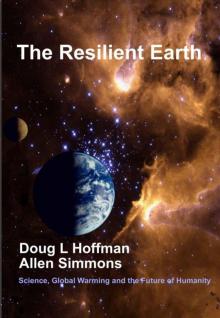The Resilient Earth: Science, Global Warming and the Fate of Humanity 

Genre: Other6
Published: 2008
View: 2470
Read OnlineRead The Resilient Earth: Science, Global Warming and the Fate of Humanity Storyline:
A million years after the birth of our sun, the violent explosion of a nearby supernova nearly ended life on Earth before it began. Over the next four and a half billion years, forces of nature shaped our planet and the life it harbored. Barely surviving the traumatic birth of the Moon, buffeted by supernovae, and bombarded by asteroids, the resilient Earth endured. And despite planet-freezing ice ages, devastating mass extinctions, and ever changing climate, life not only survived, it thrived. Today, we are told all life on Earth is threatened by a new peril--human-caused global warming. The Resilient Earth presents the science behind global warming for a general audience, separating fact from fiction and truth from exaggeration.From the Inside FlapThe Resilient Earth had its genesis in a number of events spanning several years. The authors have been friends and colleagues for more than three decades and, while they have often discussed writing a book together, the timing never seemed quite right. Then, at the start of 2007, the debate surrounding human-caused global warming reached a crescendo. Those who questioned the extent and causes of global warming, other than human CO2 emissions, were labeled "climate criminals," "industry stooges," and "traitors" by ecological activists. Those on the other side of the issue used terms like "hoax" and "scam."The shrill level of the "debate" was driven home when Hoffman attended a business meeting. A co-worker asked a seemingly innocent question: "Doug, you're a scientist, what do you think about this global warming thing?" Hoffman framed a fairly neutral reply--"I don't think it's as bad as portrayed in the media, certainly we shouldn't ruin our economy in a panic." Hearing this, the senior executive present made a sarcastic, scatological remark regarding the offered opinion and stormed out of the room. Taken aback by this emotional reaction, Hoffman resolved to look more deeply into the subject of global warming.In a matter of days, Hoffman was on the phone to Simmons suggesting that the time to write that often talked about book had arrived, and the topic should be the science of global warming--the real science, not the pseudo-science being reported in the popular media. Simmons immediately agreed and a long distance collaboration, linking coastal Texas and a log cabin in Arkansas, began. The more deeply we delved into the "facts" portrayed in the media the more concerned we became--not from fear of impending ecological disaster, but from the total lack of scientific objectivity, rationality and detachment exhibited by those on both sides of the global warming issue. About the AuthorAuthors Doug L. Hoffman and Allen Simmons both have strong backgrounds in science and computer modeling. Hoffman has a PhD in Computer Science from the U. of North Carolina where he did research in Molecular Dynamics Simulations and high-speed comparison methods for RNA, DNA and protein sequences. Currently he serves as senior grid architect for a major IP company and as an adjunct Professor of Computer Science at U. of Central Arkansas and Hendrix College. Simmons has a BSEE from U. of Miami and wrote the computer systems software for the world¿s first weather satellites-TIROS-Television/Infra-Red Observation Satellite. After TIROS, he spent 12 years working with scientists and engineers on NIMBUS weather satellites which collected meteorological, atmospheric, geological, and oceanographic data. NIMBUS had a profound impact on knowledge of Earth¿s dynamic behavior. On the island of St. Croix, USVI, Simmons and Hoffman developed a computer system to track objects at great ocean depths.Pages of The Resilient Earth: Science, Global Warming and the Fate of Humanity :